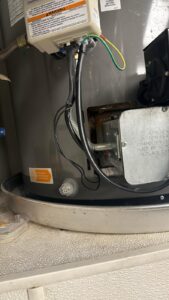Why Is My Water Heater Leaking
A leaking water heater can be a significant concern for homeowners. Not only does it waste water, but it can also lead to severe water damage and costly repairs if not addressed promptly. If you find yourself asking, “Why is my water heater leaking?” you’re not alone. In this article, we will explore the common causes of water heater leaks, how to identify them, and what steps you can take to resolve the issue. Whether you need immediate help from plumbing services near me or are looking for preventive measures, this guide will provide valuable insights.

Common Causes of Water Heater Leaks
-
Age of the Water Heater One of the most common reasons for a leaking water heater is its age. Most water heaters have a lifespan of about 8 to 12 years. Over time, wear and tear can lead to corrosion, cracks, or other forms of deterioration that result in leaks. If your water heater is approaching or exceeding its expected lifespan, it might be time to consider a replacement.
-
Loose or Damaged Connections Another frequent cause of leaks is loose or damaged connections. The inlet and outlet connections can become loose due to thermal expansion or contraction. If you notice water pooling around the connections, check them for tightness. If they appear damaged or corroded, it’s essential to call a plumber near me to address the issue.
-
Faulty Temperature and Pressure Relief Valve (T&P Valve) The T&P valve is a safety feature designed to prevent excessive pressure buildup within the tank. If this valve is faulty or stuck, it may leak water. To check the valve, lift the lever and see if water flows through the discharge pipe. If it does, the valve may need replacement. This task is best handled by a professional to ensure safety and compliance with plumbing codes.
-
Sediment Buildup Over time, sediment and mineral deposits can accumulate at the bottom of the water heater tank, especially in areas with hard water. This buildup can cause overheating and stress on the tank, potentially leading to leaks. Regular maintenance, including flushing the tank, can help mitigate this issue and extend the life of your water heater.
-
Cracked Tank In some cases, the tank itself may develop cracks or holes due to corrosion or extreme temperature changes. A cracked tank usually results in a more significant leak, which can lead to substantial water damage. If you suspect that your tank is cracked, it is advisable to contact a plumbing professional immediately for a thorough inspection.
-
External Factors Sometimes, leaks may be caused by external factors, such as a burst pipe nearby or drainage issues that lead to water pooling around the heater. Ensure that the area around your water heater is free of debris and that drainage is functioning correctly.
How to Identify a Water Heater Leak
Recognizing a water heater leak early can save you a lot of trouble. Here are some signs to watch for:
-
Puddles of Water: If you notice water pooling around the base of your water heater, it’s a clear sign that something is wrong.
-
Increased Water Bill: An unexplained rise in your water bill may indicate a hidden leak somewhere in your system.
-
Rust and Corrosion: If you see rust or corrosion around the fittings or tank, this can be an early warning sign of a potential leak.
-
Unusual Noises: Strange noises from your water heater, such as popping or hissing sounds, may indicate sediment buildup or overheating.
What to Do If Your Water Heater Is Leaking
If you determine that your water heater is leaking, take the following steps:
-
Turn Off the Power: If you have an electric water heater, turn off the power supply. For gas heaters, turn off the gas valve.
-
Shut Off the Water Supply: Locate the cold water supply valve at the top of the heater and turn it off to stop the flow of water.
-
Call a Professional: At this point, it’s best to contact plumbing services near me. A licensed plumber can accurately diagnose the issue and recommend the appropriate repairs or replacements.
-
Prevent Future Leaks: Regular maintenance is crucial for preventing leaks. Schedule annual inspections and tank flushes to ensure optimal performance and longevity of your water heater.
Conclusion
A leaking water heater can lead to significant inconveniences and damage if not addressed quickly. Understanding the common causes and recognizing the signs of a leak can empower you to take prompt action. Whether your water heater is aging, experiencing faulty connections, or suffering from sediment buildup, it’s crucial to seek professional help. Contacting a plumber near me can provide you with the expert guidance you need to restore your water heater to optimal functioning and prevent future leaks. By staying proactive, you can ensure a reliable and efficient hot water supply for your home.
- Bathroom Remodel
- DIY
- Garbage Disposal
- Home Improvement
- How To Install
- Hydro Jetting
- Kitchen Remodel
- Plumbing
- Plumbing Services
- Professional Plumber
- Slab Leak
- Tips
- Toilet Installation
- Toilet Repair
- Toilets
- Uncategorized
- Unclog Drain
- Water Heater Installation
- Water Heater Maintenance
- Water Heater Repair
- Water Shut-Off Valve